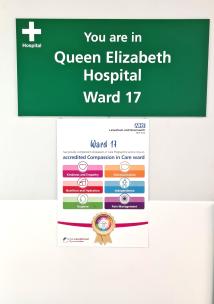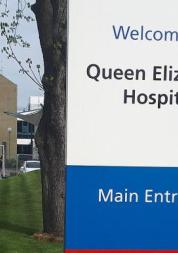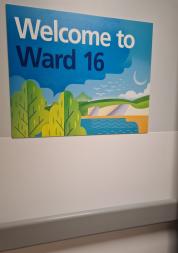Enter and View Report Ward 19, Queen Elizabeth Hospital

Ward 17 is a 28-bed surgical and gastroenterology ward, with an additional two corridor beds available during periods of high demand. It also supports gynaecological patients and serves as the designated unit for surgical patients requiring chest drains.
Ward 17 offers a care environment that reflects many of the principles associated with high-quality, person-centred care. Patients and families describe the ward as calm, clean, and well-managed, with emphasis on the professionalism and compassion of staff. The quality of interpersonal relationships between staff, patients, and families stands out, contributing to a sense of safety, dignity, and reassurance. Staff pride in their work and a clear team ethos was evident, suggesting a strong internal culture rooted in shared values and mutual respect.
While the underlying culture of care is positive, there are limitations in how well this is supported by wider systems. Information to promote transparency, empowerment, and accessibility, such as how to give feedback, raise concerns, or access communication support, was notably absent. The existence of translation services via digital tools was confirmed by staff, yet there appears to be no systematic or visible way of alerting patients or families to these options. In a diverse patient population, the absence of proactive communication around these entitlements risks reinforcing existing inequalities and may prevent some patients from fully engaging in decisions about their care.
Communication practices on the ward appear generally strong during weekdays, but inconsistencies arise during periods of high demand and particularly at weekends. Patients and families who felt otherwise well cared for described having to chase information or feeling left out of the loop. These experiences reflect a wider system challenge: even where staff are skilled and committed, structural constraints, such as staffing levels, rota design, and information systems, can compromise the continuity and reliability of communication. Importantly, patients’ and families’ confidence in care is not shaped solely by clinical quality, but by their ability to understand and participate in what is happening. Fluctuations in communication quality can undermine this trust.
Staff themselves acknowledged the impact of service pressures on their ability to deliver consistently responsive care. While morale appeared high, there was concern that demand could outweigh capacity. This was evident in discussions around the use of corridor beds. Although their use is framed as a short-term measure to manage flow, the implications for patient dignity, safety, and experience are significant. Our observations of a patient in this space, exposed to foot traffic, noise, and a lack of privacy, highlight how the use of non-clinical spaces for inpatient care can erode fundamental standards, despite the best efforts of staff. The emotional burden this places on staff was also apparent, with one describing corridor care as something “nobody is happy with.”
Food provision emerged as another area where patient experience fell short of expectations. Criticism focused not only on taste and variety but also on cultural appropriateness. While meal quality may seem a peripheral concern in the context of acute medical care, it is in fact closely tied to recovery and emotional wellbeing. The lack of culturally responsive options raises broader questions about how well institutional catering services are aligned with the demographic realities of the communities they serve.
In summary, Ward 17 benefits from a strong foundation of compassionate care, good leadership, and effective teamworking. These qualities underpin much of the positive feedback from patients and families. However, the ward’s ability to maintain this standard consistently is challenged by system-level issues, including staffing capacity, reactive communication processes, the use of inappropriate spaces for care delivery, and the limited responsiveness of wider hospital services (such as catering and information about communication support).
Download the full report here
If you would like this report in a different format, please contact caitlin@healthwatchgreenwich.co.uk

